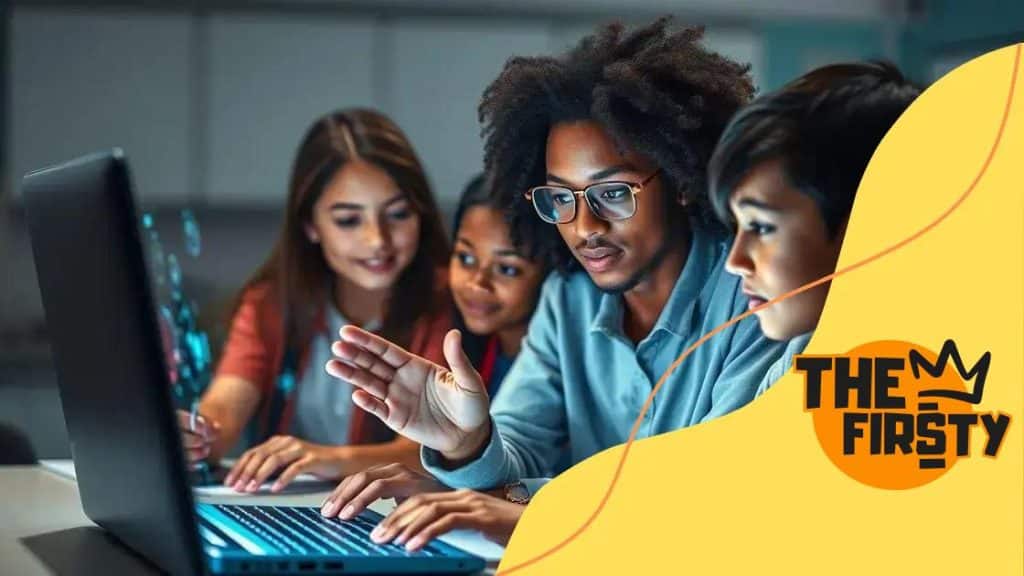How AI-powered mentorship platforms are transforming education

Anúncios
How AI-powered mentorship platforms are transforming education by delivering personalized learning experiences, enhancing accessibility, and leveraging data analytics to better connect students with mentors and support their educational journeys.
How AI-powered mentorship platforms are transforming education is a fascinating topic. Just think about how technology can personalize learning for every student! This evolution in education invites us to explore its potential.
Anúncios
The rise of AI-powered mentorship platforms
The rise of AI-powered mentorship platforms is changing how students access guidance and support. These platforms connect learners with mentors through innovative technology, making the mentorship experience more personalized.
Students can receive tailored advice, which helps them grow in their studies. By matching learners with mentors who understand their needs, these platforms create a more engaging educational environment.
Key Features of AI Mentorship
There are several key features that make AI mentorship platforms beneficial:
Anúncios
- Personalized Matching: AI algorithms analyze student profiles to match them with appropriate mentors.
- 24/7 Access: Learners can connect with mentors anytime, providing flexibility in their education.
- Interactive Tools: Many platforms offer tools like chat and video calls for real-time communication.
As technology advances, the potential for AI-powered platforms continues to grow. They can gather data on student progress and adjust mentorship strategies accordingly. This adaptability ensures that students receive the assistance they need to succeed.
Moreover, as more educators embrace these platforms, the landscape of mentorship is evolving. The combination of artificial intelligence and human expertise provides a rich resource for students.
Benefits for Students
Another significant advantage is the ability for students to learn from diverse mentors. This diversity enhances their learning experience, allowing them to view problems from multiple perspectives. Additionally, AI mentorship fosters a sense of community among learners, making them feel supported.
Ultimately, AI-powered mentorship platforms are set to expand further. As they become integral to the educational framework, they promise to support students effectively throughout their academic journeys. Students can expect to benefit from improved access to resources, making learning more accessible and engaging.
Benefits of AI in educational mentorship
The benefits of AI in educational mentorship are numerous and impactful. As students engage with mentors through AI-driven platforms, they experience a learning environment that is more personalized and effective.
One major advantage is the ability of AI to provide tailored support to each learner. By analyzing data from students, AI can offer insights that help mentors focus on individual needs and learning styles.
Enhanced Learning Experiences
Students receive feedback that caters to their unique challenges. The result is a more engaging and relevant educational experience.
- Real-time Feedback: AI can analyze student interactions instantly, allowing mentors to adjust their approach quickly.
- 24/7 Availability: Mentors can connect with students at any time, breaking down traditional barriers of time and location.
- Diverse Learning Resources: AI platforms often include various tools and resources, helping students explore subjects more deeply.
This personalization not only benefits students but also supports mentors by equipping them with data and insights. With the right information, mentors can make informed decisions about how to guide students effectively.
Additionally, AI enhances collaboration. Students can work with multiple mentors who specialize in different areas, expanding their knowledge base and perspectives. This collaborative approach fosters a sense of community and encourages peer learning.
Accessibility and Inclusivity
Moreover, AI-powered mentorship promotes inclusivity in education. Learners from various backgrounds can access the same resources, gaining opportunities that might not have been available otherwise. This democratization of knowledge allows for a more equitable educational landscape.
Overall, the integration of AI in educational mentorship cultivates a vibrant learning ecosystem. It empowers students, enhances mentor capabilities, and paves the way for a future where education is more accessible and personalized than ever.
How personalized learning is achieved

Personalized learning is achieved by adapting the educational experience to meet each student’s unique needs. With the help of AI technology, mentorship platforms gather data about learners and tailor their approach accordingly.
These platforms utilize algorithms to analyze student performance and preferences. By understanding individual learning styles, they can provide customized resources and recommendations that align with what works best for each student.
Data-Driven Insights
One key element of personalized learning is the use of data to inform decisions. AI systems track how students engage with materials, which helps identify areas where they might struggle or excel. The result is a more effective learning journey.
- Adaptive Learning Paths: AI can create dynamic learning paths that evolve based on student progress, ensuring they are always challenged but not overwhelmed.
- Targeted Resources: Students receive specific resources designed to address their weaknesses, whether through tutorials, articles, or videos.
- Feedback Loops: Continuous feedback allows students to see their improvements, keeping them motivated and engaged.
Furthermore, personalized learning encourages student autonomy. Learners can often choose their topics, pacing, and learning methods. This freedom promotes greater engagement as students take ownership of their education.
As students interact with their mentors, they may express their preferred learning methods or specific interests. AI-powered platforms can record this information, adjusting suggestions to foster a more meaningful mentor-mentee relationship. This adaptability enhances the overall experience.
Engagement and Motivation
Moreover, personalized learning can boost motivation. When students see that their education is catered to them, they are more likely to invest effort in their studies. This sense of connection encourages a deeper understanding of the material.
Ultimately, the fusion of technology and individualized attention through personalized learning creates opportunities for students to thrive. By catering to their unique needs, educational mentorship becomes a transformative experience.
Challenges of implementing AI mentorship
Implementing AI mentorship in education involves several challenges that institutions must navigate. While the benefits are clear, the hurdles can affect how effectively these systems operate.
One significant challenge is the integration of technology into existing educational frameworks. Schools and universities may struggle to adapt their current systems to accommodate AI tools.
Technical Barriers
Another hurdle is related to technology itself. Many educational institutions may not have the necessary resources to implement and maintain AI systems. Issues such as outdated hardware or lack of technical expertise can hinder progress.
- Cost of Implementation: Setting up AI platforms can require significant investment in technology and training.
- Data Privacy Concerns: Ensuring the security of student data is essential, and institutions must comply with regulations.
- Inadequate Training: Educators and mentors need proper training to leverage AI tools effectively.
Furthermore, there may be resistance to change among educators and administrators. Some may feel uncomfortable relying on AI to guide student interactions, which can impede acceptance of these innovative systems.
Cultural shifts are often necessary for successful implementation. Building trust in AI tools and demonstrating their effectiveness can take time. Moreover, stakeholders must understand that AI serves as a complement to human mentorship, not a replacement.
Ethical Considerations
Ethical considerations also pose challenges. Implementing AI mentorship requires careful thought about how algorithms might influence student outcomes. Decisions driven by AI need to prioritize fairness and avoid reinforcing existing biases.
To address these challenges, educational institutions must adopt a strategic approach. By fostering collaboration among technology experts, educators, and policymakers, schools can better navigate the complexities of AI integration. Ultimately, understanding and addressing these challenges is crucial for the future of AI mentorship in education.
Future trends in education technology
The future trends in education technology are exciting and transformative. As technology evolves, so do the methods used in teaching and learning. Schools and universities are increasingly adopting new tools to enhance education.
One major trend is the rise of blended learning. This approach combines traditional face-to-face teaching with online instruction. Students can learn at their own pace while still benefiting from direct teacher interaction.
Artificial Intelligence and Automation
Furthermore, the integration of artificial intelligence in classrooms is expanding. AI tools can provide personalized resources and support, tailoring the learning experience for each student. This level of customization helps students achieve their best.
- Smart Assessment Tools: These tools evaluate student performance and suggest areas for improvement.
- Automated Grading: AI can quickly assess student work, allowing teachers to focus more on instruction.
- Virtual Teaching Assistants: AI assistants can help answer student questions anytime, enhancing support.
Moreover, augmented and virtual reality are gaining traction in education. These technologies create immersive learning experiences, allowing students to explore complex concepts in a hands-on way. For example, students can virtually visit historical sites or conduct science experiments in a simulated environment.
Additionally, the trend of using mobile learning is growing. With smartphones and tablets, students have access to learning materials anytime and anywhere. This flexibility allows them to study at their convenience.
The Importance of Data Analytics
Data analytics also plays a crucial role in shaping the future of education. By collecting data on student engagement and performance, educators can make informed decisions to enhance the learning experience. This data-driven approach helps identify trends and informs curriculum development.
As we look ahead, the future of education technology holds great promise. With continuous advancements, students will have more resources and support than ever. Embracing these trends will lead to more effective and engaging learning experiences for all.
In conclusion, the future of education technology is bright and filled with opportunities for improvement and engagement. By embracing advancements like AI, blended learning, and data analytics, educational institutions can create personalized experiences that meet the diverse needs of students. Additionally, the ongoing integration of new tools like virtual reality and mobile learning can enhance engagement and accessibility. As we move forward, it is essential to address the challenges of implementation while keeping the focus on providing effective and equitable education for all learners.
FAQ – Frequently Asked Questions about AI-Powered Mentorship in Education
What is AI-powered mentorship?
AI-powered mentorship uses artificial intelligence to connect students with mentors, tailoring the learning experience based on individual needs and preferences.
How does personalized learning work?
Personalized learning adapts educational content to fit each student’s learning style, making it more engaging and effective.
What are the challenges of implementing AI in education?
Challenges include technical barriers, data privacy concerns, and resistance to change among educators and institutions.
What future trends should we expect in education technology?
Future trends include blended learning, increased use of AI and data analytics, and the adoption of virtual reality for immersive learning experiences.





